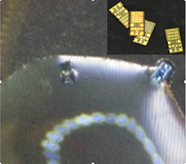Chemical Microprocessors

Microscopic Electronic Agents

The BioMIP research team carries out basic multidisciplinary research into the nature and limits to physical and evolutionary self-organisation in natural and artificial chemical information systems at the micro- and nanoscales. Such information systems are vital for controlling natural functions in living organisms and are becoming increasingly important at the interface between three rapidly expanding technologies: Information Technology (IT), Biotechnology (BioT) and Nanotechnology (NanoT).
Our research involves theory and experiment into chemical and electronic systems which self-organize and evolve like living systems, processing information to solve complex problems, using a synthetic systems approach. Our aim is to develop novel forms of constructive information processing systems based on and extending the core principles of living systems.
Lablets_on_dock

Just as future IT will, like biology, interact increasingly with real world ongoing fabrication and repair of functional information systems at the nanoscale, future nanotechnology and biotechnology will become more and more programmable and in interaction with autonomous same-scale devices and information systems.
Electronic micro-and nanosystems provide controlled and programmable environments for studying and optimizing such systems, and so our research is also deepening the link between the three rapidly expanding technologies: Information Technology (IT), Biotechnology (BT) and Nanotechnology (NT).
BioMIP was a guest group in the Chemistry and Biochemistry Faculty of the Ruhr University Bochum from 2004-2017. It is currently seeking a new host environment. John McCaskill is now a fellow of the European Center for Living Technology.
The most recent international project researched Electronic Genomes in connection with the group’s major initiative in electronic chemical systems.


